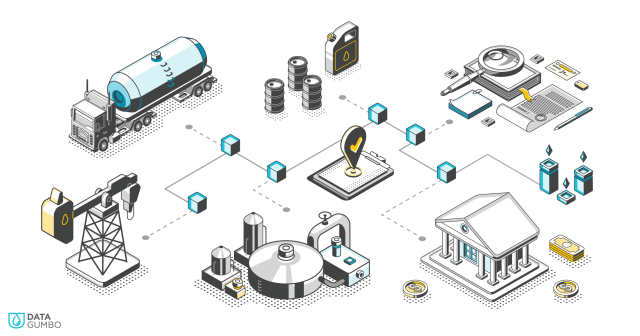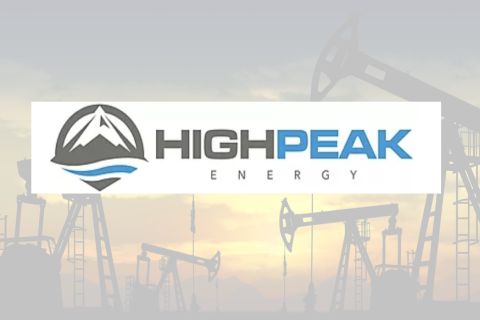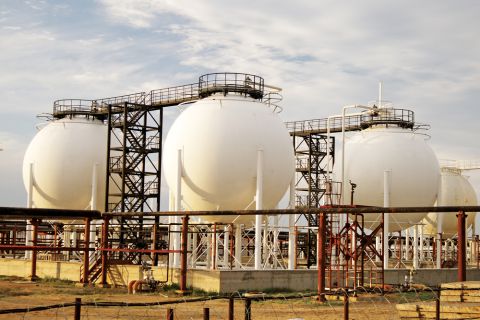
A powerful way to do business, blockchain smart contracts validate field operating information then trigger automated payments based on pre-agreed terms. (Source: Data Gumbo Corp.)
If data is bad, the conclusions drawn from that data will always be bad. This is true regardless of industry or application. Poor data quality from the field has long plagued oil and gas operators, making decision-making around lease operating expenses (LOE) slow and imprecise, in turn, continually yielding subpar conclusions and adding complexity to timely decision making.
Current methods for managing an asset’s LOE are resource and time-intensive practices that aim to capture commodity production, chemical consumption, water haulage and disposal, fuel, power, labor, rental equipment and other well service expenses.
For an onshore well, LOE costs averages one to three million dollars over a 20-year life of a well. The paper trails and manually-handled tickets that estimate services performed typically take more than 60 days to work through field approvals and accounting systems processes. They are also prone to disputes and reconciliations that compound complications and further exacerbate delays between service providers and operators—all of which obfuscate financial visibility for production spend and management.
This means that most oil and gas operators are functioning with a sizable inability to tie spend to production and profitability. Without a universal record of truth for parties, it is difficult to capture transactional certainty in commercial relationships as companies tend to tether their separate versions of reality to their separate databases.
Is there a way of rethinking how we view LOE costs? Can an operator make a real-time cost-benefit analysis around each LOE line item for each well? Which wells are uneconomic after oil prices drops? Can processes be put into place that tie actual field measurements to payments in real time? Can payment data be rolled up to provide a daily view of LOE exposure to remove uncertainty and risk and take decisions faster?
The answer to all of these questions is yes.
Currently, blockchain is used all over the world by companies such as Maersk to track shipping containers and other oil and gas companies that want to remove inefficiencies. Smart contracts, supported by the immutable power of blockchain technology, can make real-time LOE a reality for operators while offering an approach that reduces friction and eliminates inefficiencies, and that can automate transactional relationships.
Removing the Guesswork
Imprecise measurements, lack of real-time data and nontransparent information-sharing practices between parties have long contributed to an environment of mistrust and delay. These factors also yield fictitious cost and revenue views for operators—a dangerous game in today’s market where companies must operate on razor-thin margins while focusing on the manual accuracy of production and revenue accounting.
LOE reporting often relies on estimates that indicate approximations of real-world events, tied up invoices and elongated payment cycles that make it all a bit of a guessing game, one undercut by fear and consequences on both sides of the equation. At worst, underestimations lead to money lost to overbilling or fraud. At best, overestimation results in unfavorable financial adjustments that impact market perception of business understanding within the company. When real numbers eventually become available, operators must make adjustments to financial statements that can contribute to ups and downs in the market, in addition to impacting how investors and other stakeholders view a business.
For the most part, the data required to solve real-time LOE exists within current operator and vendor systems. Commercial terms of existing contracts can be automated with smart contracts, an approach that harvests operational field data and rolls up results to drive strategic decisions for well portfolios. Right now, allocating resources based on transactional certainty is important, especially in these times of volatile oil pricing. Not only does the ability to understand LOE on a granular level provide a foundation to make better production decisions, but it can provide necessary investor confidence to elevate corporate value. Smart contracts give all parties a clear understanding of costs and time incurred, alleviating LOE reporting issues. Instead of relying on field estimates to book accruals that can be misstated while true operating expenses are stuck in invoice mode, waiting on paper field tickets and manual confirmation of services, smart contracts integrate with real-time field data sources to pull exact information and measurements to continuously revise financial visibility.
At its simplest, smart contracts deploy blockchain’s immutable distributed ledger technology to record and allocate what happened, where it happened and who did it. As a new, powerful way to do business, blockchain smart contracts can validate field operating information that then triggers automated payments based on pre-agreed terms.
Leverage Existing Systems
In some cases, auditors flag unmanned locations where vendors must verify or prove data to support reported reality. In these autonomous locations, systems provide the data required for process validation. Smart contracts leverage existing data sources and can generate auditable, unchangeable records to provide the confirmation required to know exactly what happened in the field. For example, the flow of production chemicals from tanks to a particular wellhead can be measured by the manifold setting of the pumps on-site, giving precise data on what chemical costs should be paid, and which well they should be allocated to, in near real time. Other well services can be captured in electronic field tickets and validated by operators installed surveillance systems or third-party GPS tracking.
For those worried about resources required to retrofit field assets with sensors and meters, the costs and options to collect field data have vastly improved in recent years. For example, stronger network connectivity in the field, an increased reliance on remote operating centers, better availability and accuracy of sensor data through SCADA and the ability to manage by exception have contributed to the uptick of smart contract adoption among operators.
Frequently, a reduction in overbilling through vendors rounding more than pays for installing better sensors. For example, a simple tank level may yield only 10% accuracy of volume measurements, while a combination of inexpensive external tank sensors or flow meters can be accurate to a single percent. This can give an operator confidence in the volumes delivered or hauled, capture precise information for LOE management, and allow for a vendor to invoice and receive payment at speed based on agreed measurement data. When tying spend to production, granular data is the key to calculating an accurate ROI.
Operators must be able to identify and define exact costs before being able to tackle methods to reduce those costs. Leveraging technology can drive greater economic productivity and optimize value. Smart contracts enhance financial statements as costs happen versus estimates of costs, helping operators to identify waste and certain areas of spend that can be reduced as it occurs, not after the fact.
Blockchain technology and smart contracts allow for more informed and strategic decisions around LOE. Being able to know real-time costs can help operators not only understand their business better but enable them to stay atop of their expenses and invest in better returns for production.
Recommended Reading
For Sale, Again: Oily Northern Midland’s HighPeak Energy
2024-03-08 - The E&P is looking to hitch a ride on heated, renewed Permian Basin M&A.
Gibson, SOGDC to Develop Oil, Gas Facilities at Industrial Park in Malaysia
2024-02-14 - Sabah Oil & Gas Development Corp. says its collaboration with Gibson Shipbrokers will unlock energy availability for domestic and international markets.
E&P Highlights: Feb. 16, 2024
2024-02-19 - From the mobile offshore production unit arriving at the Nong Yao Field offshore Thailand to approval for the Castorone vessel to resume operations, below is a compilation of the latest headlines in the E&P space.
E&P Highlights: Feb. 26, 2024
2024-02-26 - Here’s a roundup of the latest E&P headlines, including interest in some projects changing hands and new contract awards.
CEO: Continental Adds Midland Basin Acreage, Explores Woodford, Barnett
2024-04-11 - Continental Resources is adding leases in Midland and Ector counties, Texas, as the private E&P hunts for drilling locations to explore. Continental is also testing deeper Barnett and Woodford intervals across its Permian footprint, CEO Doug Lawler said in an exclusive interview.





